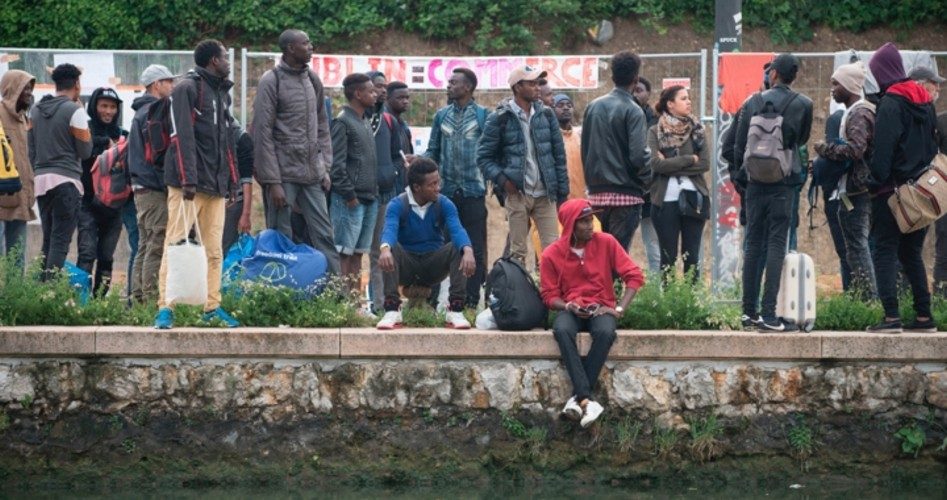
The continued surge of immigration into France, largely from Middle Eastern Muslim-majority countries such as Eritrea, Somalia, and Sudan, is creating intense political disputes inside the country. On Wednesday, riot police began clearing one of the larger camps in Paris of homeless migrants and refugees at about 6:00 a.m.
It is the 35th evacuation of a homeless migrant camp in just the past three years. Eighteen months ago, a camp of about 8,000 was cleared around Calais.
But after police forcibly dismantle the camps, and destroy their tents, the homeless migrants and refugees simply set up camp elsewhere in Paris. Those living inside the camps are said to experiencing “catastrophic sanitary conditions.”
Not surprisingly, what the government should do in reaction to this growing problem brought on by increased immigration is disputed. The mayor of Paris, socialist Anne Hidalgo, leveled her criticism at President Emmanuel Macron, charging that his “centrist” government is not doing enough to help the migrants. Pierre Henry of France terre d’asile, an aid group, said, “This is an issue of dignity. Street camps should not exist in our country.” Their solution is for the national government to provide shelter for the thousands pouring into the country.
Of course, the more the French government would provide aid to incoming migrants and refugees, the more people would cross the Mediterranean Sea into France, or from other European countries. In the European Union (EU), each member country is severely limited in what it can do to keep out those migrating from another EU nation.
Despite campaigning for president as a supporter of immigration. During his campaign, he praised Germany’s Chancellor Angela Merkel, who is perhaps the EU’s leading proponent of increased immigration. Macron said Merkel’s pro-immigration policy during the 2015 migrant and refugee crisis saved Europe’s “collective dignity.” However, Macron is now facing a rising tide of resentment over the issue.
Yet the migrants and refugees just keep coming, and their numbers are rising, with a 17-percent increase in the numbers desiring asylum in France last year. That is more than 100,000 people. About 36 percent of these applicants are granted refugee status. With a growing homeless problem in cities such as Paris, and a rising crime rate, it is not surprising that polls indicate a strong majority of the French think there are too many migrants in France already.
In response, Macron has proposed that a law be enacted to criminalize the illegal crossing of the French border. In response, charity groups have condemned the law as oppressive. At Ofpra, France’s refugee protection office, workers even went on strike to protest Macron’s bill, calling it “an unequivocal departure from France’s tradition of asylum.” They argued that the government was paying too much attention to public opinion on the issue.
According to the Macron proposal, presently under debate, the consideration period for an application for asylum will be reduced to only a six-month maximum, instead of the present year-long period, which includes the time for an appeal. Defenders of the asylum seekers argue that this will deprive them of their rights.
Concern in the United States about the problems associated with immigration contributed to the election of Donald Trump in 2016. Globalist elites are clearly at odds with the populations of not only the United States, but also the nations of the European Union. Their disdain for Trump was well illustrated in a recent article in the globalist Foreign Affairs magazine (published by the Council on Foreign Relations) of May/June 2018, in which Trump, well known for his opposition to uncontrolled immigration, was smeared as an “openly racist, sexist, authoritarian, and xenophobic candidate.”
The Foreign Affairs article by Ronald Inglehart of the University of Michigan expressed concern about the “outlook for democracy.” The author’s principal concern centered on the growing opposition to immigration — which Inglehart dismisses as a “far-right” position.
This is interesting, considering that a majority of the French population are calling for more, not less, immigration controls. It appears that, to the globalists that run the Council on Foreign Relations, “democracy” is not so much government according to the wishes of the majority, but governmental policies that are in line with globalist desires.
While Inglehart clearly considers Macron’s principal opponent in the last French presidential race, Marine Le Pen, as an example of a far-right proponent of immigration restrictions, it appears that even Macron now believes something must be done about the problems associated with the rising tide of immigration into his country.
Or at least Macron wants it to appear that he is doing something, because if he doesn’t, France’s electorate may decide to replace him with someone who will take action.
Photo of migrants in Paris neighborhood: AP Images



